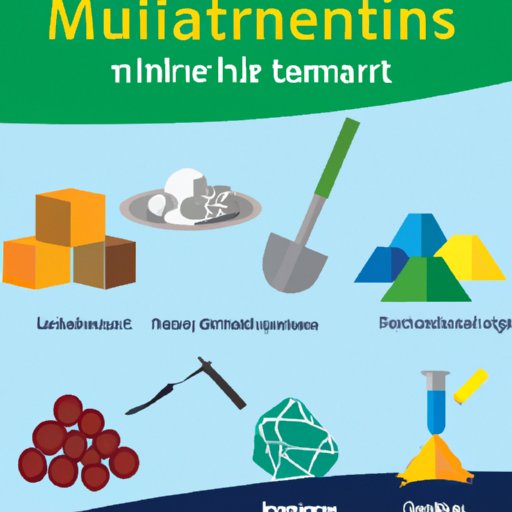Introduction
Minerals are naturally occurring compounds that have distinct chemical and physical properties. They are essential for various biological processes and play a significant role in human nutrition, industrial applications, and environmental effects. Understanding the chemical properties of minerals is important for determining their suitability for different uses. Comparing the chemical properties of minerals can help us to better understand their potential applications and the potential risks associated with them.
Comparing the Chemical Properties of Minerals
The physical properties of minerals include color, hardness, luster, streak, and cleavage. These characteristics can be used to identify minerals and distinguish them from other substances. The chemical properties of minerals include composition, solubility, acidity, and reactivity. These properties are determined by the type and amount of elements present in the mineral.
The composition of minerals differs from other substances due to the presence of certain elements in specific amounts. For example, some minerals contain metals such as iron or copper, while others may contain silicon or sulfur. These metals and other elements determine the chemical properties of the mineral, such as its solubility, acidity, and reactivity. Different combinations of elements can produce different chemical properties, which can be used to identify and classify minerals.
Exploring the Role of Minerals in Human Nutrition
Minerals are essential for maintaining good health and are required for many bodily functions. They are necessary for the formation of bones and teeth, muscle contraction, and nerve transmission. Minerals also play a role in energy metabolism and hormone production. Without sufficient amounts of minerals, the body cannot function properly.
Minerals can be obtained from food sources such as fruits, vegetables, meat, fish, and dairy products. Whole grains, legumes, nuts, and seeds are also good sources of minerals. Some minerals, such as calcium, magnesium, and iron, are more readily available in these foods than others. Supplements can also be taken to ensure adequate intake of minerals.
Consuming a balanced diet rich in minerals is important for overall health and well-being. By understanding the chemical properties of minerals, we can better assess their suitability for different uses in the body. For example, some minerals are better absorbed than others, so it is important to choose foods with the right types of minerals for optimal health.

Investigating the Impact of Mining on Mineral Chemistry
Mining is the process of extracting minerals from the ground. It involves digging out rock and soil to uncover the desired minerals. This process can have a major effect on the chemical properties of the minerals, as they are exposed to different temperatures, pressures, and chemicals during the mining process.
Mining can cause changes to the composition of minerals, as some elements may become more concentrated while others are removed. This can affect the solubility, acidity, and reactivity of the minerals, making them less suitable for certain uses. Additionally, mining can lead to water contamination, air pollution, and soil erosion, which can have a negative impact on the environment.

Examining the Role of Minerals in Industrial Applications
Minerals are used in a variety of industrial applications, such as manufacturing building materials, fertilizers, and cosmetics. They are also used to create pigments for paint and ink, and to make glass and ceramics. Processing minerals can alter their chemical properties, making them more suitable for certain uses. For example, heating and cooling can change the solubility, acidity, and reactivity of minerals.
Using minerals in industry has both advantages and disadvantages. On one hand, minerals are abundant and relatively inexpensive, making them an attractive option for industrial production. On the other hand, processing minerals can release hazardous chemicals into the environment, which can have a negative impact on human health and the environment.

Analyzing the Environmental Effects of Mineral Extraction
The environmental impacts of mineral extraction are varied and complex. Mining can lead to water contamination from runoff of chemicals used in the process, as well as air pollution from burning fuels. Soil erosion can also occur, leading to land degradation and loss of biodiversity.
To mitigate the environmental effects of mining, governments and companies must take steps to reduce the amount of pollutants released into the environment. This includes monitoring air and water quality and implementing stringent regulations on mining operations. Additionally, reclamation efforts should be employed to restore the land after mining is complete.
Conclusion
In conclusion, minerals play an important role in human nutrition, industrial applications, and environmental effects. Understanding the chemical properties of minerals is essential for determining their suitability for different uses. Mining can have a major effect on the chemical properties of minerals, and careful monitoring is needed to reduce the potential risks associated with mineral extraction. By exploring the chemical properties of minerals and their role in human nutrition, industrial applications, and environmental effects, we can better understand their potential uses and the potential risks associated with them.
(Note: Is this article not meeting your expectations? Do you have knowledge or insights to share? Unlock new opportunities and expand your reach by joining our authors team. Click Registration to join us and share your expertise with our readers.)
